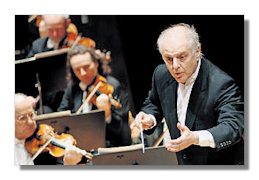
The Internet's Premier Classical Music Source
Related Links
- Latest Reviews
- More Reviews
-
By Composer
-
Collections
DVD & Blu-ray
Books
Concert Reviews
Articles/Interviews
Software
Audio
Search Amazon
Recommended Links
Site News
 Concert Review
Concert Review
Bohemia in Paris

- Bedřich Smetana:
- Má Vlast (My Country)
Vienna Philharmonic Orchestra/Daniel Barenboim
Paris, Théâtre des Champs-Elysées, 20 December 2016
Má Vlast, the cycle of six symphonic poems composed by Smetana between 1874 and 1879, makes for highly attractive concert programming. It forms the perfect antidote for those who think that the traditional three-part concert offering has had its day. While not as long as most concerts, one still doesn't feel short-changed by the 75 or so minutes, because when heard in one sitting without a break, the rich and diverse microcosm of Má Vlast turns out to be quite an engrossing musical experience. Forget the famous Moldau too often heard as a single evergreen. Only when placed within the cycle the river flows with a purpose and Smetana's thematic structure and vivid imagination can be appreciated better than ever.
Daniel Barenboim and the Vienna Philharmonic Orchestra are touring Europe with Má Vlast in preparation of the opening concert of next year's prestigious Prague Spring International Festival. This is undoubtedly a daunting task as much as a great honor, but the concert in a packed Paris Champs-Elysées Theatre showed both conductor and orchestra in tremendous doing and left a powerful impression. And even if the most chauvinistic music critics in Prague next May will probably tell you differently, the Viennese seem to connect naturally with the lyricism and rhythms of Bohemia. In this respect it's good to remember the orchestra recorded Má Vlast at least three times in the last 60 years – with conductors as different as Rafael Kubelik, James Levine and Nikolaus Harnoncourt.
Strongly dramatic, often darkly colored, but also grand and festive when required, this performance of Má Vlast under Barenboim was fascinating from start to end. Not the call-to-arms as exemplified by Kubelik and the Czech Philharmonic at their most patriotic, but nonetheless a stirring exploration full of contrasting sonorities and carried by very flexible but never disagreeable tempi and dynamics, which (Barenboim hasn't been conducting at Bayreuth for almost two decades for nothing) also frequently reminded us of Smetana's predilection for the music of Liszt and Wagner. Barenboim, who conducted from memory, demonstrated a firm grip on the structure of each poem, but equally kept the bigger picture in mind. He appreciated the affinity of the Viennese players with this music and knew exactly how to balance a certain amount of freedom with exacting precision. The consistency of his approach enhanced the impact of the cycle as a whole just as much as it displayed the ingenuity of Smetana's vision. The final appearance of the Vyšehrad theme at the end of Blanik sounded like a homecoming after a long and emotional voyage that had started with the simple harps in Vyšehrad. The two final poems Tábor and Blanik, strongly linked, appeared like a suspenseful quest from darkness to light, allying often mysterious sonorities with telling silences and well-judged releases of tension to balance the drama.
Color was also fundamental in Vltava and From Bohemia's Woods and Fields highlighting beautiful solo work from the Viennese woodwinds (clarinet and flute, especially), and the sometimes rugged horns adding extra spice. The brass practically covered the whole width of the stage and while Smetana uses them frequently to great effect, Barenboim avoided all bombast. It was however more than anything the magnificent strings ensemble, homogenous and precise to delight, that brought the whole picture to life and gave this Má Vlast a beating heart – whether in the romantic flowing of Vltava, the passionate events electrifying šárka, the superb fugal passage in From Bohemia's Woods and Fields or the high-octane drive in Tábor. Antiphonally placed, Barenboim dosed them carefully, now as leading sections, then again in a supporting role.
Concerning the orchestral balance, here and there I missed some weight in the lower strings sound, although that might have been caused by the placement of the orchestra in this venue. The Champs-Elysées Theatre doesn't have a very wide stage and the double-basses, placed at the far left, were partly hidden behind the proscenium arch. In the heat of the action the woodwinds also tended at times to be a tad too prominent, while on the other hand the timpani, placed towards the left side, didn't always produce the same impact. Yet these are minor quibbles about what was by all means a wonderful concert that should, eventually, do the Vienna Philharmonic and Daniel Barenboim in Prague proud.
Copyright © 2016, Marc Haegeman












